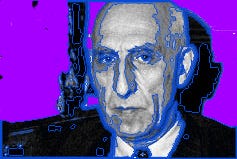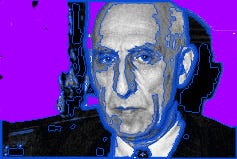Notes on Iran IV
Mohammad Mossadegh
“My countrymen lack the bare necessities of existence” Prime Minister Mossadegh told the UN in October 1951. “Their standard of living is probably one of the lowest in the world. Our greatest natural asset is oil. This should be the source of work and food for the population of Iran. Its exploitation should properly be our national industry, and the revenue from it should go to improve our conditions of life. As now organized, however, the petroleum industry has contributed practically nothing to the well-being of the people or to the technical progress or industrial development of my country. The evidence for that statement is that after fifty years of exploitation by a foreign company, we still do not have enough Iranian technicians and must call in foreign experts.”
“Although Iran plays a considerable role in the world’s petroleum supply and has produced a total of three hundred fifteen million tons over a period of fifty years, its entire gain, according to accounts of the former company, has been only one hundred ten million pounds sterling. To give you an idea of Iran’s profits from this enormous industry, I may say that in 1948, according to accounts of the former Anglo-Iranian Oil Company, its net revenue amounted to sixty-one million pounds; but from those profits Iran received only nine million pounds, although twenty-eight million pounds went into the United Kingdom treasury in income tax alone…”
“I must add here that the population living in the oil region of southern Iran and around Abadan, where there is the largest oil refinery in the world, is suffering in conditions of absolute misery without even the barest necessities of life. If the exploitation of our oil industry continues in the future as it has in the past, if we are to tolerate a situation in which the Iranian plays the part of a mere manual worker in the oil fields of Masjid-i-Suleiman, Agha Jari and Kermanshah and in the Abadan refinery, and if foreign exploiters continue to appropriate practically all of the income, then our people will remain forever in a state of poverty and misery. These are the reasons that have prompted the Iranian parliament—the Majlis and the Senate—to vote unanimously in favor of nationalizing the oil industry.”[1]
In August 1953 the CIA organised a coup in order to remove him from power.
“For more than a decade Mossadegh never left (the) compound (in Ahmad Abad). He could have, because his sentence confined him only to the village, not strictly to the compound. Police agents, however, were under orders to follow and observe him if he stepped beyond the gates. He preferred solitude to their company.”
“The compound is quite a pleasant place, with paths through gardens and arbors, and the manor house is comfortable though hardly luxurious. Mossadegh was not idle here during his long imprisonment. He supervised the work of about two hundred peasants who worked in nearby fields, training them in the use of modern farm equipment and even winning an agricultural prize for a scheme that increased sugar beet production. His family had traditionally produced lawyers and doctors, and since he had already learn learned most of what there was to know about law, he devoted himself to studying medicine. He read medical texts and boiled local roots to make antimalaria medicine. When villagers became sick, he treated them. For those who fell seriously ill, he wrote notes that gained them admission to the Najmieh Hospital in Tehran, which his mother had founded. Many brought him their small problems and found him unfailingly attentive and generous.”
“During his long hours of solitude, Mossadegh spent much time in his upstairs library. He immersed himself in old interests, reading Islamic philosophy and the works of political theorists like Montesquieu and Rousseau, and developed new ones like cooking. He eliminated fried foods from his diet and ate only those that had been steamed or boiled. One of his favorite books, which is still in his study, was the Larousse Gastronomique.”
“Still, for one who lived within the walls of this compound for so long, it must have taken on something of the air of a prison. During his years there, Mossadegh was often unwell, suffering from periodic bouts of bleeding ulcers and other ailments. Relatives who visited him say that he was depressed, discouraged, and demoralized. He mourned not for the loss of his own power but for the collapse of his dreams for Iran. Nothing he did in Ahmad Abad was able to raise his spirits.”
“‘I am effectively in jail,’ he wrote in his memoir. ‘I am imprisoned in this village, deprived of all personal freedoms, and wishful that my time would be up soon and I would be relieved of this existence.’”[2]
For Zoroastrianism, which sees life as a struggle on the part of the supreme creator (Ahura Mazda), representing life and truth, against the forces of evil and darkness, in which man is judged by the extent of his commitment to one side or the other, Mohammad Mossadegh will undoubtedly be remembered as a force for life and truth.
His enemies, in America, Britain and Iran, however, will be remembered as forces of evil and darkness.
[1] pp.123-124 All the Shah’s Men, Stephen Kinzer
[2] p.219-220 Ibid





Incredible tragic story of Mossadegh. House arrest for so many years. It’s no wonder the Iranians choose to look to their own people for everything.
A businessman here in Ireland has named his pub or restaurant after him.